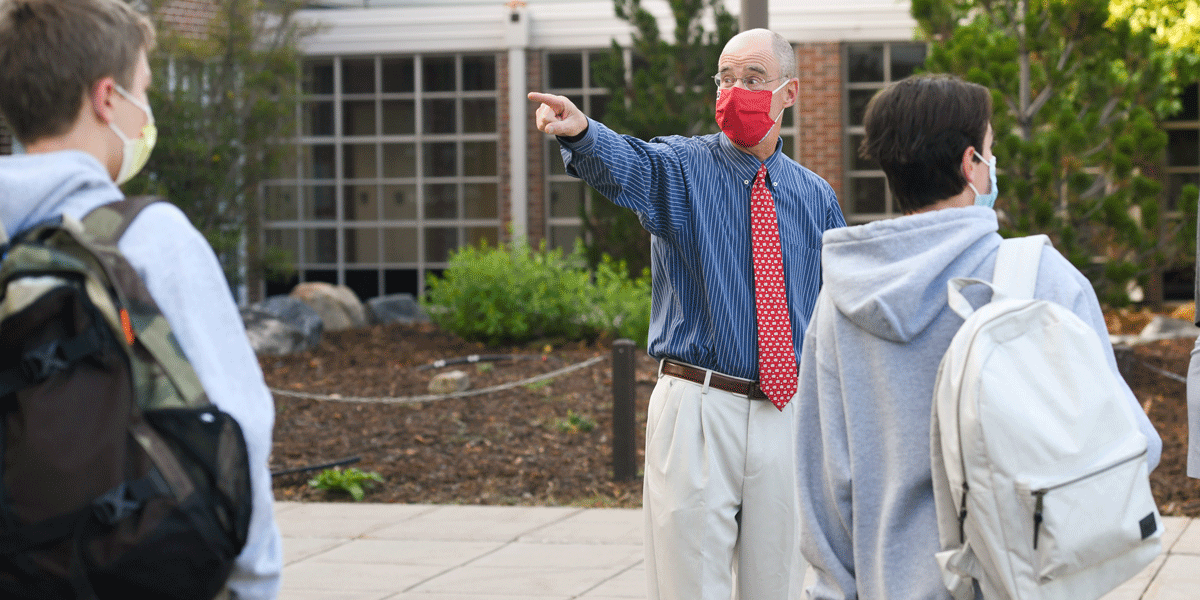School is launched at Colorado Academy, and students are getting to know the teachers and our expectations for independent thought and achievement. They are also well on their way to adopting the social distancing behaviors and daily routines that will allow, we hope, CA to remain open. Better still, it feels like school. The Middle School kids arrive with crinkly “smiling” eyes above their masks, cheery “hellos” and “how are yous,” and a bounce in their step, as they head over to chat with friends or to the classroom. Lunch time and break are the usual bustle of activity, with kids playing their own version of four square, soccer, tennis, or catch. This is both good and important to see and reflects children’s ability to normalize almost anything and get on with growing up.
It is important, because school is about both academic and social/emotional growth. School is an accelerator of both types of growth. While last spring we felt good about the academic program we were able to provide via Zoom, we knew that key ingredients, the ability of kids to be together and develop social skills, were compromised by the virus.
Our current “hybrid” learning model is a thoughtful compromise that creates significant safety by reducing classroom density, while allowing for important mask-to-mask teacher-to-student and student-to-student interaction. While not perfect—how I long for “regular” school—I believe that we can work together to help kids move forward in the development of those academic and social skills needed for long-term success.
Something to think about in the coming months is remarkably similar in each growth area.
Academic
Our long-term goal for students is for our kids to develop the necessary skills and predispositions to be independent learners. We actually don’t need our child to be great at every subject. We do want them to be good learners. This involves the ability to collaborate, problem solve, read closely, and express ideas verbally and in writing. Reaching these goals will take many years and involve a wide variety of experiences in and out of school. I put independent in italics because for many students it is during the Middle School years that they move along the continuum from more dependent learners to becoming more independent, more able to self-advocate, manage the opportunities and challenges of a complex learning environment, and utilize their unique strengths.
As parents, we want to walk the fine line between supporting our child and not supporting them too much—asking ourselves at critical moments, “Is the action I am considering furthering my child’s independence and ability to manage their own academic life?” will be increasingly important. Are there moments to intervene? Of course, but asking the question may sometimes create the space for your child to build their resilience and self-advocacy muscles more quickly.
Social/Emotional
Our long-term goal is for our children to be able to independently manage their social life in such a way that sustained long-term relationships based on trust and caring can flourish. There is that independent word again! And it is important. We want our kids to develop empathy, compassion, self-control, and decision-making skills that allow them to develop meaningful relationships. This is, after all, one of life’s greatest joys.
Perhaps not surprisingly, Middle School is one of the crucibles for this development. I don’t use the word “crucible” lightly, as there sometimes is a bit of heat, and certainly a bit of transformation, that happens, sometimes painful transformation. Helping our kids learn to manage the complexity of social relationships, particularly how to be empathetic and kind, while being true to yourself, is tough work. As parents, it may once again be helpful to ask ourselves, “Is the action I am considering going to support my child to be better able to manage their social life thoughtfully and independently?”
Ironically, there is a lot of research that indicates that when parents feel anxious—like when there is a life-and-death pandemic going on—we tend to restrict our child’s freedom in an effort to protect them. This is natural and understandable. We all want our kids to be safe. Looking for small ways that our child can practice greater independence, even during these trying times, will likely pay dividends. Our kids will develop their decision making abilities, learn from their mistakes through natural consequences, and in general, move more quickly toward discovering their strengths and full capabilities. Unquestionably, this is a loooong process, which unfolds in fits and starts over time, but the small, and sometimes large, decisions we make as parents are important to encouraging wings to unfurl.
